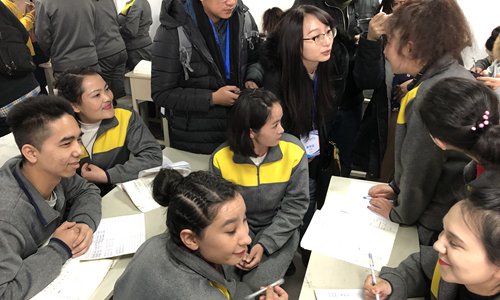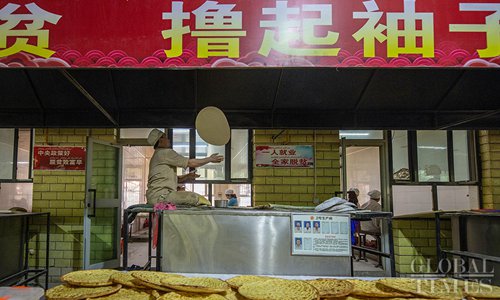HOME >> CHINA,SPECIAL-COVERAGE
Human rights, counter-terrorism experts tell true Xinjiang stories in global arena
By Liu Xin Source:Global Times Published: 2019/7/12 9:49:52
Human rights, counter-terrorism experts set the record straight

Visitors take selfie at the Grand Bazaar in Urumqi, capital of Northwest China’s Xinjiang Uyghur Autonomous Region on July 5. Photo: Cui Meng/GT

A media group from Indonesia and Malaysia talks to trainees in an education and vocational training center in Hotan, Northwest China's Xinjiang Uyghur Autonomous Region in February. Photo: Liu Xin/GT
Editor's Note: In recent years, Northwest China's Xinjiang Uyghur Autonomous Region has attracted international attention for its measures on counter-terrorism and de-radicalization.
Some Western media and experts criticized China's policies in Xinjiang, which have been refuted by China.
To better elaborate on its policies on religion and ethnic groups in Xinjiang, and show the development on human rights in the region, China has sent delegations to meetings of the United Nations Human Rights Council (UNHRC).
Many Chinese experts on human rights and counter-terrorism, who have been invited to attend international seminars and sideline meetings of the UNHRC, also gave lectures on Xinjiang's policies.
Global Times reporter Liu Xin reached three experts on human rights and counter-terrorism familiar with China's Xinjiang policies who were invited to talk about Xinjiang at international forums.

Photo: Yang Ruoyu/GT
Misunderstandings
Zhang Yonghe, executive dean of the Human Rights Institution of Southwest University of Political Science and Law in Chongqing, have been to Xinjiang several times. He attended many international meetings and seminars, including the UNHRC meeting in Geneva in November.
The current misunderstandings on China's Xinjiang policies are mainly on the vocational education and training centers, Zhang said.
"Some foreign experts, who have little knowledge of Xinjiang's situation, call the education and training centers 'camps.' They don't know that the centers aim to educate and rehabilitate people guilty of minor crimes or being influenced by extremism. In Western countries, people who commit crimes would be sent to jail and those who violate laws would be punished," Zhang said.
Some foreigners are also curious about how the trainees get rid of extremism.
Zhang said the centers' curriculum includes the use of standard spoken and written Chinese, law, vocational skills, and courses on the eradication of extremism.
"Knowing standard Chinese language would help trainees know more about modern life and the development of the country. With knowledge of laws, they would not be easily tempted and misled by extremism. By learning vocational skills, they can earn a good living," Zhang told the Global Times.
"The education and training centers are, in a sense, an alternative mechanism for compulsory education or a form of continuing compulsory education. They offer people, who had dropped out of school when they were teenagers, a chance to finish compulsory education," said Qian Jinyu, executive dean of the Human Rights Institution of Northwest University of Political Science and Law based in Shaanxi Province.
"Previously, due to the influence of extremism, many children were forced to drop out of school and never got a chance to complete compulsory education. The enrollment rate of children of school age in some places in Xinjiang was low. Those who left school at an early age would be easily tempted and taken advantage of by terrorists," Qian said.
Muchi Yundengjiacuo opposed foreign scholars' reference to education and training centers as "camps" during an exchange with international scholars in Bishkek, Kyrgyzstan in November 2018.
Muchi is the dean of the School on Ethnic and Religious Studies at Northwest University of Political Science and Law. He was one of the Chinese scholars invited to discuss China's policies on ethnic groups.
In response to questions on "whether Xinjiang has put Muslims into the camp and if it violates human rights," he said that the education and training centers are not camps and not meant to put people there. People who had been misled by terrorists are receiving education on eradicating extremism in accordance with laws.
The education centers not only help prevent terrorist attacks and save those who had gone astray, but also acquire vocational skills. This is to protect human rights on a higher level, Muchi said.
Muchi told foreign experts that one of the main courses at the education training centers guides trainees influenced by extremism to know accurate religious doctrines.
"I took part in the arraignment of Paxiaguli Tohti, a principal suspect in the terrorist attack in March 2014 in Kunming, Southwest China's Yunnan Province. We could not link the delicate woman with the one who wore the burqa and wielded a knife and killed people in the video on the incident," Muchi said.
On March 1, 2014, eight knife-wielding Xinjiang terrorists attacked passengers at the Kunming Railway Station Square and the ticket lobby, leaving 31 dead and 141 injured, according to a white paper in March.
"We asked about her feelings after two years in prison. She said that she lived in fear of being sent to hell after death. She said that her husband kept telling her that Xinjiang belongs to Uyghur Muslims and they must drive all heretics out of the place. He also said that they must have 'jihad' to realize their promises to Allah," Muchi noted.
During her two years in prison, she began to read the Koran, which says that killing an innocent person is like killing everyone, and people who do this would go to hell.
"She said that she killed so many innocent lives and would be sent to hell. She lives in fear," Muchi said.
He noted that "from this example we can see that most of the people instigated to join terrorist attacks had little knowledge of the true doctrines of Islam, and were the victims of terrorists who want to separate the country.

Photo: Cui Meng/GT
Communication techniques
Muchi is not the only one who tells true and vivid stories to show what is happening in Xinjiang.
Zhang said that he attended a seminar with US scholars in December 2018. They insisted on setting the agenda on China's Xinjiang policies.
"So I delivered a speech on the difference between measures on counter-terrorism and de-radicalization in China and Western countries," Zhang said.
Zhang noted that some Western countries required people who might be influenced by extremism to acquire learning materials on extraditing extremists from the community. These people usually live in separate areas. But in Xinjiang, especially in southern Xinjiang, people who have been influenced by extremism usually live in the same village.
Organizing intensive learning on de-radicalization knowledge in areas plagued by extremism has proven to be effective, Zhang said.
Qian also noted that to explain the current relations of different ethnic groups in Xinjiang to a Turkish scholar, he told a story he learned while conducting a survey in Xinjiang.
Qian's story was about You Liangying, who lives in Aral city and Memetiturup Musake from Pishan county in Hotan Prefecture. Memetiturup used to work for You for a short time in 2005. One year later, You got a call from Memetiturup, who asked if he could borrow 10,000 yuan ($1,454) to pay for his wife's medical fees.
Although You's family is not wealthy, she gave the money to save Memetiturup's wife. Three months later, at the invitation of Memetiturup, You went to his house. But she was surprised by the poverty of the family. She voluntarily asked to help the family and Memtiturup's village by sharing her skills in planting date trees and growing cotton.
Memetiturup now calls You "sister" and the two families have developed an intimate relation.
Qian concluded from You's stories that people of all ethnic groups can live in one family harmoniously. You's story is only one of the numerous stories in Xinjiang.
"The Turkish scholar was surprised by my stories, saying that they are quite different from what he usually hears," Qian said.
He noted that this experience also showed the importance of frequent communication with foreign experts to show them what is really happening in Xinjiang. "And we need to do this in a way that is easy to accept, like telling individual stories."
Zhang said that he used to talk about Xinjiang stories with people from the Organization of Islamic Cooperation and they said, "Oh, that's what is happening in Xinjiang!"
"They told me that they got news about Xinjiang from BBC or CNN, which would only provide a few voices from China on Xinjiang," Zhang said, noting that these people also expressed their hope to know more about Xinjiang.
Inviting many foreign media and diplomats to Xinjiang would give them a better perspective on China's Xinjiang policies.
Zhang said that criticizing China has become "political correctness" in some Western countries.
"But people who have a sense of justice would detest terrorism and extremism. And those who live under the threat of terrorism would strongly resent terrorism. They would have their own judgment, especially when they see Xinjiang's stability and development in recent years," Zhang said.
Qian said one of the biggest obstacles to communicating with foreign scholars on Xinjiang is their bias.
"The Chinese always say 'No investigation, no word.' I usually invite foreign scholars to Xinjiang to make sure that they are qualified to talk about Xinjiang," Qian said.
Newspaper headline: Xinjiang’s true stories emerge
Posted in: IN-DEPTH,FEARTURED STORIES